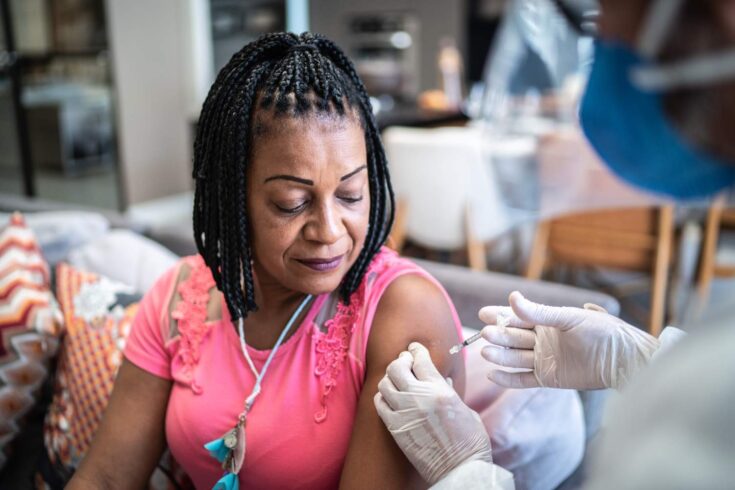Interrupting the treatment of people on long-term immune supressing medicines for two weeks after a COVID-19 booster vaccination doubled their antibody response.
The vaccine response on off methotrexate (VROOM) trial will have implications for people on immune-supressing medicines, who are among the millions of clinically vulnerable patients advised to ‘shield’ during the pandemic.
The results of the study are published in The Lancet Respiratory Medicine.
The trial was funded by the Medical Research Council (MRC) and the National Institute for Health and Care Research.
It was led by researchers at the University of Nottingham in collaboration with colleagues from The University of Manchester and Queen Mary University London. The study was run by the Oxford Clinical Trials Research Unit.
Commonly used immune-suppressing drug
The study planned to recruit 560 patients, but recruitment was stopped early by the independent study oversight committee when interim results from the first 254 participants showed a clear result.
Methotrexate is the most commonly used immune-suppressing drug, with around 1.3 million people in the UK prescribed this medicine for inflammatory conditions such as rheumatoid arthritis, and skin conditions such as psoriasis.
Many of them were among the 2.2 million clinically extremely vulnerable people advised to shield during the first phase of the COVID-19 pandemic, depending on specialist advice and on their risk factors.
Methotrexate is effective at controlling these conditions and has emerged as first line therapy for many illnesses. However, it reduces the body’s ability to fight infections and the ability to generate robust response to flu and pneumonia vaccines, including those against coronavirus (COVID-19).
Impact of interrupting treatment
The VROOM trial looked at the impact of interrupting methotrexate treatment for two weeks after a COVID-19 booster vaccination on vaccine responses in adults with autoimmune inflammatory conditions.
Patients older than 18 years in age were recruited from dermatology and rheumatology outpatients in 26 NHS hospitals across England and Wales.
The trial evaluated temporarily stopping versus continuing methotrexate treatment immediately after the third primary dose or booster of the COVID-19 vaccine.
During the trial 127 participants were asked to suspend methotrexate use for two weeks and 127 to continue using it as usual. The decision on who stopped or continued with methotrexate treatment was made by a computer program, similar to tossing a coin or rolling a dice.
Comparing spike-antibody levels
The team compared the spike-antibody levels between the two groups four weeks and 12 weeks after they had received a COVID-19 vaccine dose. The spike-antibody blocks the virus from infecting cells inside the body.
After four weeks and 12 weeks, the spike-antibody level was more than two-fold higher in the group where methotrexate was suspended for two weeks following vaccination, compared to the group who continued use.
There was a worsening of disease control at week four in the suspended group, but that had normalised by week 12. There was no impact on quality of life or general health.
Quality of the antibody response
Given the initial findings of the study, the independent study steering committee advised to stop further recruitments into the VROOM trial.
Participants who took part in the VROOM study are being invited to participate in an additional visit six months after their vaccination date.
The spike-antibody level reflects the strength of the antibody response.
The research team are currently examining the quality of the antibody response by measuring its ability to kill live SARS-CoV-2 viruses and other variants of concern such as Omicron.
Improving protection
Chief investigator, Professor Abhishek, at the University of Nottingham and Nottingham University Hospitals NHS Trust, said:
We are extremely pleased with the initial results of the VROOM trial. There was a doubling of the antibody response in patients who held off on taking methotrexate for two weeks.
The improvement in antibody response was maintained over a three-month period. There was a short-term increase in risk of flare-up of inflammatory conditions. However, most could be self-managed.
We also saw no adverse impact on the quality of patient’s life following suspension of their medication. However, the study did not evaluate whether this strategy would result in fewer cases of COVID-19 or fewer hospitalisations due to COVID-19 as it was not large enough to detect these differences.
Implementing these results could vastly improve the protection provided by boosters against COVID-19 for millions of people living with these conditions. COVID-19 has left them vulnerable to serious illness, whilst still having to live with the painful and troubling effects of their conditions.
We hope this evidence is the next step in helping them with their lives going forward.
Important implications
Joint lead Professor Rosemary Boyton, from Imperial College London and Royal Brompton Hospital, said:
This study is the first to report the effectiveness of a two-week interruption of an immunosuppressant drug called methotrexate immediately after COVID-19 booster vaccination to enhance antibody binding immunity against SAR-CoV-2.
Our results showed a doubling of antibody levels, an increase that was sustained at 12 weeks.
This has important implications for future vaccination strategy in this immunosuppressed patient group.
Optimising medical interventions
Professor John Iredale, Executive Chair of MRC, which part-funded the trial, said:
This important finding means many people who need to take immune-suppressing medicines now have a safe and effective way to improve their immune response to life-saving COVID-19 vaccines.
This study shows yet again how the UK research community’s world-leading ability to rapidly set up well-designed clinical trials can deliver the evidence needed to optimise medical interventions and save lives in the pandemic.
This content is provided by the University of Nottingham.
Top image: Credit: FG Trade, E+ via Getty Images

